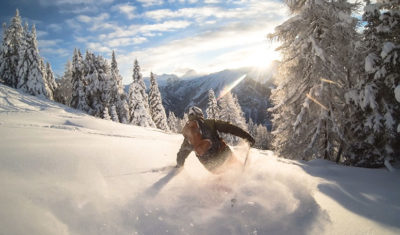Surgeon warns skiers to take care after unprecedented extreme weather injuries in the Alps

A leading surgeon last night warned skiers to take extra precautions after treating an exceptionally high number of ski injuries due to the extreme weather conditions in the Alps.
France has warned skiers to exercise “extreme caution” after an avalanche killed two people bringing the death toll in the French mountains to 25 since the ski season began in November.
Mr Simon Moyes, an orthopaedic surgeon at the Wellington Hospital in London, last night said that the dangerous conditions are also causing many more injuries than usual.
“My colleagues and I are seeing far more ski injuries than normal this year,” he said. “The massive snowfalls in the Alps are very unusual and are creating extremely challenging ski conditions.
“The snow is very, very deep and the edges of the piste are not as visible as normal so people are finding themselves off-piste without realising. There is then a danger of falling into a crevasse, which can lead to death or bad injuries.”
Mr Moyes, who is a keen skier himself, said the number of knee injuries has been particularly high. “I’ve been treating an unusual number of fractures, dislocations and ligament and cartilage tears,” he said.
He is advising skiers heading out to the Alps that there are a number of things they can do to reduce the risk of injury:–
Cardiovascular Fitness
Try to build as much cardiovascular fitness as you can before your trip. If you are tired you will be less alert and more likely to fall.
Strengthen Quads
Work on your quads with squats, leg presses, cycling and stair climber machines. Try holding the chair position against a wall until you feel the burn. Strong quads will prevent your legs from becoming weak and wobbly and will help you stay in control on the slopes.
Get Bendy
Increase your flexibility with yoga, pilates or simple calf, quad and hamstring stretches. This will reduce the risk of muscle and ligament tears.
Check Bindings
Once you are out there, make sure your ski fitter sets your bindings correctly. “In my experience they are often set too high by the local ski shops,” Mr Moyes said. “The less experienced you are the looser your bindings need to be so that your skis detach from your boots if you fall. Ask the person who is fitting them to demonstrate that the boot will come out of the ski easily.”
Be Cautious
When conditions are bad there can be a temptation to head out on to the slopes in inclement weather to ensure your skiing holiday is not a write-off. However, this can mean you are skiing in poor visibility on hazardous pistes. “The pistes are very varied this year,” Mr Moyes added. “You can ski from fresh powder to patches of sheet ice on the same bit of slope. You need to be very alert.” Don’t ski if you are unwell or have a hangover. Watch out for other skiers and snowboarders – the worst injuries are collisions with other people. And know your limits – this is not the year for inexperienced skiers to test themselves on black runs.
Full Insurance
Most people take out ski insurance but don’t always realise that when they land back in the UK the policy no longer applies because many policies just cover you for treatment in the mountains. “Ideally you want a policy that covers treatment back in the UK too so you can see a specialist quickly,” Mr Moyes said. “It’s important to treat injuries early because you are more likely to have a successful surgical outcome.”
